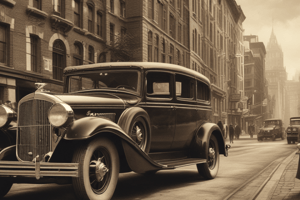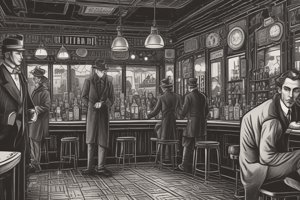Podcast
Questions and Answers
How did prohibition affect corruption in the early 1900s?
How did prohibition affect corruption in the early 1900s?
Prohibition increased corruption because people ignored the law.
Which statement best describes the beliefs of the 'wets' in the early 1900s?
Which statement best describes the beliefs of the 'wets' in the early 1900s?
- They supported the production of alcohol.
- They thought prohibition would improve society.
- They believed prohibition would reduce crime.
- They thought prohibition would take away people's rights. (correct)
Why did Congress pass the Volstead Act to go along with the Eighteenth Amendment?
Why did Congress pass the Volstead Act to go along with the Eighteenth Amendment?
The Volstead Act provided for the 18th amendment.
What did the 18th Amendment to the US Constitution accomplish?
What did the 18th Amendment to the US Constitution accomplish?
Why did some proponents of Prohibition support the policy on religious grounds?
Why did some proponents of Prohibition support the policy on religious grounds?
Who was John Scopes, the defendant in the 1925 Scopes trial?
Who was John Scopes, the defendant in the 1925 Scopes trial?
In the early 1900s, who was Al Capone?
In the early 1900s, who was Al Capone?
Why did taxes cause leaders to be reluctant about prohibition?
Why did taxes cause leaders to be reluctant about prohibition?
During the 1925 Scopes trial, what was the defense's main argument?
During the 1925 Scopes trial, what was the defense's main argument?
Why was the 21st Amendment to the US Constitution necessary?
Why was the 21st Amendment to the US Constitution necessary?
Flashcards are hidden until you start studying
Study Notes
Prohibition Overview
- Prohibition heightened corruption as many individuals disregarded the law, leading to increased illegal activities.
- "Wets," opponents of Prohibition, believed it infringed upon personal liberties and rights.
Legislation and Amendments
- The Volstead Act was enacted to facilitate enforcement of the Eighteenth Amendment, which prohibited the production, sale, and transport of alcohol.
- The 18th Amendment was significant as it marked the beginning of nationwide alcohol prohibition in the United States.
Motivations for Prohibition
- Some supporters of Prohibition championed it from a religious perspective, seeing rampant alcohol consumption as immoral.
Notable Figures
- John Scopes, a key figure in the 1925 Scopes Trial, was a teacher charged with violating laws against teaching evolution.
- Al Capone rose to infamy in the early 1900s as a notorious bootlegger, capitalizing on the demand for illegal alcohol.
Economic Considerations
- Leaders hesitated to endorse Prohibition due to the absence of income taxes, as the government relied heavily on liquor taxes for revenue.
Educational Debates
- During the Scopes Trial, the defense contended that evolution was a scientific reality, highlighting the clash between science and religious beliefs.
Constitutional Changes
- The 21st Amendment was crucial as it repealed the Eighteenth Amendment, restoring the legality of alcohol in the United States.
Studying That Suits You
Use AI to generate personalized quizzes and flashcards to suit your learning preferences.




